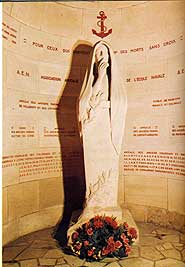Just up the road from Verdun, where Maréchal Pétain (who 24 years later collaborated with the Nazi regime) saved the city from the German onslaught launched to ‘bleed the French army dry’, is the Douaumont Ossuary. Here the bones of 130,000 unknown young men gather dust and an occasional glance from a passing tourist. Above them the marbled hall, which echoes even to the footfall of trainers, is bathed with blood-red light from the stained glass window. Here, in a dark alcove ignored by most, is the statue of Silence which when erected in 1919 stood plainly outside the front door of the provisional ossuary. Slightly bigger than life-size, the figure of a woman with a shawl over her head holds a silencing finger to her lips. The message – that the truth about the futility of the war is best not uttered – is hard to miss. Now, lost in its alcove’s shadows, even this 87-year-old injunction is fading from sight. The awfulness that should not be spoken of has become as irrelevant as the words carved on the skirt of
 Silence: AUX HEROS INCONNUS. Such words are inscribed in one language or another on war memorials and in war cemeteries round the world. They have proffered heroism as the prevailing, false, and irrelevant explanation of the war – a war in which these dead soldiers have been stripped even of their names.
Silence: AUX HEROS INCONNUS. Such words are inscribed in one language or another on war memorials and in war cemeteries round the world. They have proffered heroism as the prevailing, false, and irrelevant explanation of the war – a war in which these dead soldiers have been stripped even of their names.